HT: First Importance
Friday, May 30, 2008
I Am Your Hell--and You Are My Heaven
HT: First Importance
The Space Between the Wall and My Van
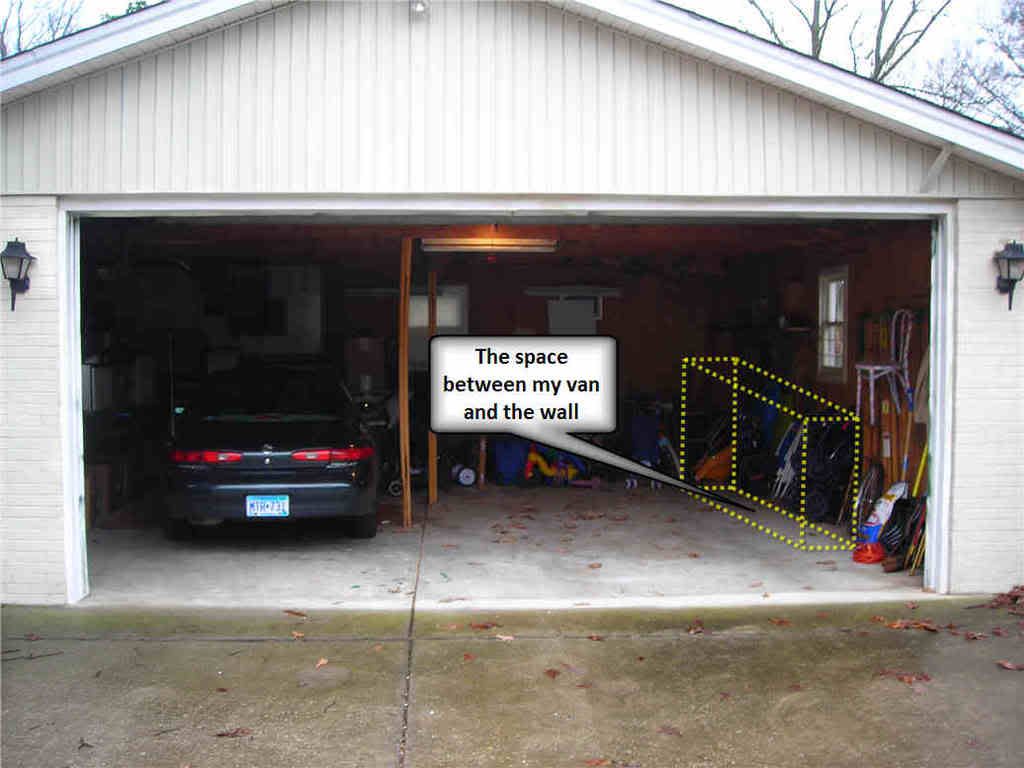 The house we are renting here in Louisville has a huge 2 1/2 car garage with plenty of room to store all of our children's toys, strollers, and bikes at the end of the garage and yet be able to walk around the vehicles when parked in the garage. This is a huge contrast to the so-called 2-car garage we had in Minnesota. There, we had to park the van and the car next to each other with their side mirrors overlapping--about 6 inches between each vehicle all just to be able to get out of our vehicles. It was pretty tight. So the other day as I was getting out of the van, I realized how much you appreciate things like open space when you didn't have it before. Not only am I incredibly blessed to have two vehicles I own, I am blessed with an abundance of stuff to put into a garage.
The house we are renting here in Louisville has a huge 2 1/2 car garage with plenty of room to store all of our children's toys, strollers, and bikes at the end of the garage and yet be able to walk around the vehicles when parked in the garage. This is a huge contrast to the so-called 2-car garage we had in Minnesota. There, we had to park the van and the car next to each other with their side mirrors overlapping--about 6 inches between each vehicle all just to be able to get out of our vehicles. It was pretty tight. So the other day as I was getting out of the van, I realized how much you appreciate things like open space when you didn't have it before. Not only am I incredibly blessed to have two vehicles I own, I am blessed with an abundance of stuff to put into a garage.But you know what thought hit me harder than all of that? Most people in the world outside of Disneyland-America live with all of their possessions... in a space that would fit between the wall and my van.
Thursday, May 29, 2008
The Gospel for a Perfect Memory
From a 20/20 Interview, By Keturah Gray and Katie Escherich, May 9, 2008:
"I am in the moment, but I also have, like this split screen in my head. I always explain it to people like I'm walking around with a video camera on my shoulder. And every day is a videotape. So if you throw a date out at me, it's as if I pulled a videotape out, put in a VCR and just watched the day. As it happened. From my point of view. "I walk around with my life right next to me”
Price remembers what she was doing on those days, just as she relives every moment of her life, good and bad. It's not just the look of her first crush that she remembers, it's the painful sting of rejection. Price acknowledges that it can be paralyzing.
… Many people think that Price's gift may be a dream, but she says "it's good and bad" and can sometimes feel like being a prisoner of her own past.
… "She was not easy," Price's mother Roz said of her childhood. "And that's because everything that was going through her head she couldn't explain. There were things I would think to myself, 'Why doesn't she just get over that?' said her brother Mike. "And I realize now that … a year passing for something, for me, you know, I've forgotten it already. But, obviously she doesn't."
… Price's experience serves as a reminder that our lives and happiness may be shaped not only by what we remember, but by what we choose to forget.
Can you even begin to imagine what this would be like? There could definitely be some benefits! Think about the advantage you would have in playing Trivial Pursuit! Or, as she pointed out on an NPR interview, you would never ever forget where you put your keys, your purse, your glasses, etc. But as was pointed out in the interview, it would also be crippling.
Yesterday, your kids drove you up the wall and you let out words you wish you could take back. Today that scene would keep playing over and over. But if you were Jill, it wouldn’t stop there. Not only would you remember it vividly tomorrow, next month, next year, and the next decade, but you would also with superb clarity remember every time you had done something like that before and how the pain would just compound like an unrelenting charge-card bill.
This condition of Jill’s has only been discovered in the last couple of years, and the only thing they can do for her right now is analyze her. So far, they’ve only confirmed 5 other people with the same condition.[1] Is there any hope for this to stop? Probably not in this lifetime.
As a person who believes that our biggest problem in life is not what happens to us, but what is inside us—sin—Jill’s problem reminds me of how the Gospel is for both unbelievers and believers. How so? First, one of God’s purposes in the Cross was to redeem all things from the curse of sin (Colossians 1:19‑20). Because Christ paid the price due for sin (a righteous man with inherent infinite worth), He removed the barrier that occurred from Adam’s sin. Adam’s sin resulted in the curse affecting all of creation including our physical minds including Jill’s mind. But you may be thinking, “But Christ died on the cross 2000 years ago and it sure looks like nothing’s been redeemed yet in creation.” In our eyes, it’s hard for us to see clearly because our vision is so myopic, but from the moment Christ began his earthly ministry, God began redeeming back creation.[2] God sees His plan of redemption holistically knowing the end from the beginning. So, slowly, God is changing things—through the power of the Gospel, He is redeeming back everything. This redemption will be climaxed at His return when He will finish what He started, when He will judge all the wrongs, and fix all that has been broken. Until that time, things aren’t the way they’re supposed to be. So, the Gospel first applies to Jill, and all of us, in remembering that all that is messed up in creation will be redeemed back completely because of what Christ accomplished at the center of history on the Cross.
Secondly, the Gospel applies to life right now. While the God who made the Universe and everything in it has the power to miraculously fix her brain right now to stop remembering all of her past sin, I couldn’t promise her that it would stop just because she would place her faith in Christ alone. I don’t know Jill and whether she has placed her faith in Christ alone to save her, but let’s say for the sake of the story that she has only recently repented and believed in the Gospel. And for the sake of the story, let’s say that He didn’t heal her brain and she has to go on living with this pain of an unforgiving memory every day. What is she to do? How does the Gospel apply to her right now?
Sometimes even as people who have been forgiven of all of our sin, we tend to be more aware of our sin than of grace. I have a legalistic tendency when I’m overwhelmed by my present sin or past sins to make promises like reading the Bible more, praying more, be more involved, start fasting, but, as Jerry Bridges points out, “Our promises of future obedience, however sincere, do not resolve condemnation for past sin.” (The Gospel for Real Life, p43) This is one reason how the Gospel applies to me every day—one reason why I need to preach this truth to myself everyday: Romans 8:1 tells me that because of what Christ has done, there is now no condemnation. There is total forgiveness. When I am conscious of the sins in my life, I must remember that the solution to combating sin is not simply to introduce more spiritual disciplines (which are necessary for my spiritual sustenance), but to come to the Cross and once again confess to God my sin, despise it for what it is, and thank Him for the total forgiveness He accomplished on the cross.
But Jill and we need to understand even more practically what to do with memories of the past. Robert Jones points out how God wants to redeem your memories now, not remove them. He says that the Gospel helps us remember three things: God was in your past, your past does not control your future, and your memories result from your interpretation of your past. (Bad Memories: Getting Past Your Past, pp4-7) A great example of how this works out can be seen in how the Apostle Paul himself dealt with his memories of his past. He says in 1 Timothy 1:12-17:
12I thank him who has given me strength, Christ Jesus our Lord, because he judged me faithful, appointing me to his service, 13though formerly I was a blasphemer, persecutor, and insolent opponent. But I received mercy because I had acted ignorantly in unbelief, 14and the grace of our Lord overflowed for me with the faith and love that are in Christ Jesus. 15The saying is trustworthy and deserving of full acceptance, that Christ Jesus came into the world to save sinners, of whom I am the foremost. 16But I received mercy for this reason, that in me, as the foremost, Jesus Christ might display his perfect patience as an example to those who were to believe in him for eternal life. 17To the King of ages, immortal, invisible, the only God, be honor and glory forever and ever. Amen.
Paul starts off sounding like he was only formerly a great sinner and we would think that the next thing he would say (in light of all the great things in his life) is that he is now something much better. But what does he say? He says that he is still the foremost sinner—or literally, the most sinning sinner. He follows with that wonderful conjunction but. But I received mercy. Paul does not glory in his own accomplishments or wallow in his present failures, He glories in the fact that in light of what he is, he yet received mercy and forgiveness at the Cross. And this mercy seen in his life is an outward demonstration to others to draw them to receive the same forgiveness. Finally, this granting of mercy pulls us to worship the One because He alone can grant mercy and forgiveness!
Here’s an even more startling fact: Jill’s memories and your own memories of sin can be transformed to make them precious to you. What? How in the world? Jones says this: “… when the dandelions of your past spring up—unwelcome and uninvited—you must seize them as opportunities to remember the cross. ‘Yes, Lord, I sinned, and I am ashamed,’ you confess. ‘But Jesus paid for my sin. He absorbed the wrath that I deserved. I am now forgiven—fully forgiven—as far as the east is from the west. Please weed these memories from my mind. But until you do, I will praise you for your saving grace in Jesus my Lord.’” (Bad Memories: Getting Past Your Past, p19)
This is why and how we need the Gospel as believers. We are people who at times are overwhelmed with the reality of our frailty and failures. If you’re Jill, you may be overwhelmed all the time. But the power of Gospel is greater than all powers—it is the power of God Himself! (Romans 1:16) You need reminder of the total forgiveness on a daily basis and the only place for this is accomplished is in a cross-centered life.
[1]An excerpt from her book The Woman Who Can’t Forget can be read on this NPR webpage: http://www.npr.org/templates/story/story.php?storyId=90596530
[2]This is why Jesus said things like He did in Matthew 12:28 when He said that when miracles occur around you, you should realize that the Kingdom of God is here. This the proverbial tension of the already and the not yet.
Monday, May 19, 2008
T4G Musings, Part 3
 The San Francisco Chronicle reported today on a heralding from UCC president, John Thomas, to a congregation and the world, "Friends, we need a sacred conversation on race." They were led in a corporate prayer acknowledging to God, "You created us in divine likeness, diverse and beautiful, but too often, we have failed to see every race and every person as a reflection of your image." From the UCC's website, it appears that the goal in mind is to "have a conversation on race" that will lead to "develop processes that will lead to productive dialogue and action."
The San Francisco Chronicle reported today on a heralding from UCC president, John Thomas, to a congregation and the world, "Friends, we need a sacred conversation on race." They were led in a corporate prayer acknowledging to God, "You created us in divine likeness, diverse and beautiful, but too often, we have failed to see every race and every person as a reflection of your image." From the UCC's website, it appears that the goal in mind is to "have a conversation on race" that will lead to "develop processes that will lead to productive dialogue and action."While I'm sure that you find this very interesting, you're probably wondering what in the world this has to do with the "Together for the Gospel" conference! Bear with me...
On the church's website, you'll find a document designed to spell out the presuppositions undergirding this new campaign on fighting racism. In "Principles and Assumptions Underlying a Conversation on Race", assumption #6 states,
People who understand that racism is rooted in a 400 year old system of economic exploitation, and that it was constructed, rationalized, and legitimized for economic gain, are less likely to see it as innate to humans and, therefore, inevitable. Racism was socially constructed, therefore, not given in “nature”. “nature”.[i]
Here is where I want to bring in the third conference session from T4G: Thabiti Anyabwile woke nearly everyone up at the conference by beginning his session saying that "We all have the wrong assumptions about race." He delivered on his premise. Everyone I've talked to about this session agreed that he brought us into a paradigm shift. The liberal UCC denomination on the surface appears to be starting to say the same thing that caused my mind to start changing: "Racism was socially constructed, therefore, not given in 'nature.'" Posited this way as "racism" I think many people could understand what they are saying. However, Thabiti took us much further than simple racism--he said the what we call "race" does not even exist! I'll say it again so that you don't skim over it: Race does not exist.
 So if you're not mind-boggled yet, hang on! How can he say that what we call "race" does not exist? It comes down to unbiblical thinking. We have missed the boat entirely. How is this unbiblical? He argues that we are all genealogical descendants of Adam and as as sons of Adam, we are all made in the image of god (the imago dei). Check it out from Genesis:
So if you're not mind-boggled yet, hang on! How can he say that what we call "race" does not exist? It comes down to unbiblical thinking. We have missed the boat entirely. How is this unbiblical? He argues that we are all genealogical descendants of Adam and as as sons of Adam, we are all made in the image of god (the imago dei). Check it out from Genesis:- 1:26-28 says that we are made in God's likeness.
- 3:20 brings out the biological unity of all mankind.
- 5:1-3 shows that in the genealogy of Adam Seth is a man in "the image of Adam" and Adam is in "the image of God."
- 9:5-6 shows the value in mankind because we are still made in imago dei!
- 10:1, 32 demonstrate the continuity from Noah in all three of his children. Races have often been pointed towards specific sons of Noah, but here we see that they all are in the image of Noah who was in the image of his father and so on.
In the 17th and 18th centuries Genesis 10 was used to develop a theology of race attempting to answer where races come from, where the apparent biological discontinuity is coming from. However, Thabiti pointed out that Genesis 10 is about "ethnicities." The term race commonly argues that there are essential biological differences whereas ethnicities is a fluid construct that includes language, nationalities, citizenship, cultural patterns, and is not rooted in biology. Race is a myth.
Our continuity with each other and Adam is the emphasis of Scripture. Our basis for identity is in Adam and hence the imago dei.
Thabiti then challenged us with 6 reasons for abandoning race. Race ...
- ... encourages abuse of people and Scripture
- ... is a short step from race to racism (It's a matter of degree, not kind.)
- ... prevents/hinders meaningful engagement with others
- ... denies the authority/sufficiency of Scripture (i.e. You won't find race in Scripture)
- ... leads to resisting the conviction of the Holy Spirit
- ... undermines the Gospel itself in the work of missions (if not all people are descended from Adam, then not all are in need of salvation)
For those of us who really wanted to dig into this topic more, Thabiti recommended two books (which I plan to purchase and read eventually!) that can help us think carefully, biblically along these lines:
- From Every People and Nation, by Hays and Carson
- The Forging of Races, by Colin Kidd
[i] The reference to a "400 year old system" is likely to the arrival of African slaves in St. Augustine, Florida delivered by Spanish conquistador Pedro Menéndez in 1565.
Friday, May 16, 2008
My Greatest Enemy
Why is this so? Think about it this way (from Kris Lundgaard's The Enemy Within):
Literature smolders with hatred: Shylock aches for his pound of flesh in The Merchant of Venice. Javert dogs Jean Valjean through sixteen hundred pages of Les Miserables. C. S. Lewis's arch-villain Weston degenerates from thug in Out of the Silent Planet to "un-man" in Perelandra, ripping open the backs of frogs with his thumbnail and leaving them to die. But none of these can sustain a pure hatred to match Captain Ahab's eternal malice in Moby Dick. Ahab chases the White Whale across the oceans of the world. He doesn't blink to forfeit his ship and every life it carries, if only he can heave his harpoon into that terrible eye.
Moby Dick is a picture of our savage battle: let the White Whale stand for God--but don't be quick to make Captain Ahab the flesh. Ahab is the whale's enemy, but Paul says the flesh is more than God's enemy: it is the enmity, the hostility the pure hatred itself. The carnal mind is enmity against God; for it is not subject to the law of God, nor indeed can be. (Romans 8:7 NKJV)
If the whale is God and Ahab's hatred is the flesh, then who is Captain Ahab?
You were.
. . . .
If there were the least thing about God that the flesh could appreciate, the believer could have a constant shelter and retreat from sin and its hatred. If the flesh didn't mind God's wisdom, for example, the soul could meditate on the mystery of the gospel day and night without tiring, and find constant strength in God's plan to save him. But the flesh hates everything about God. Since it resists everything about God, it resists every way we try to taste him and know him and love him. And the more something enables us to find God and feast on him, the more violently the flesh fights against it.
In other words, the more you fight against sin by seeing and savoring God, the harder your flesh is going to fight against that since it hates everything about God. Lundgaard continues:
It takes its battle to every quarter of the soul: When the mind wants to know God, the flesh imposes ignorance, darkness, error, and trivial thoughts. The will can't move toward God without feeling the weight of stubbornness holding it back. And the affections, longing to long for God, are constantly fighting the infection of sensuality or the disease of indifference.
Captain Ahab was driven by his rage to chase the whale to the end. The flesh is just as driven, and will with its last breath spit at God. But there is in us a Warrior just as committed to the flesh's destruction. The Spirit wars against the flesh (Galatians 5:17). Filled with the Spirit, empowered by God's love of us and our love for him, we turn on the flesh with our Captain's own curse:
Towards thee I roll, thou all-destroying but unconquering flesh; to the last I grapple with thee; from heaven's heart I stab at thee; for love's sake I spit my last breath at thee.
Don't underestimate the power of the flesh and its bent towards sin. If you do, it will destroy you. It will destroy you. Sin crouches at your door and wants to master you (Genesis 4:7). John Piper says it this way: “Nobody goes to hell because of Satan. The only reason we go to hell is sin. Much more important than fighting Satan is fighting sin.” Listen here about how critical this battle truly is.
Thursday, May 15, 2008
Who Defines God's Goodness?
Jonah 3:10 - 4:1 When God saw what they did, how they turned from their evil way, God relented of the disaster that he had said he would do to them, and he did not do it. But it displeased Jonah exceedingly, and he was angry.
God is good. The character of God has infinite facets. “God is a Spirit, infinite, eternal, and unchangeable, in his being, wisdom, power, holiness, and truth.”[i] Of these and many other attributes, Scripture often emphasizes that God is great and good, powerful and loving. In Jonah’s book, these qualities are on display. The crux of the book is Jonah’s defense. “I knew that you are a gracious and compassionate God, slow to anger and abounding in love, a God who relents from sending calamity” (Jonah 4:2). The problem is that this knowledge didn’t make a difference. If anything, it made things worse, at least from Jonah’s perspective.
Odd, given Jonah’s confidence in God’s love, that he would avoid trusting him. Didn’t he believe that God was also merciful to Israel? But his experience matches our own. We might believe that God loves us, but we aren’t so sure he will give us what we want. We want to be loved, and we also want to dictate the way and by whom we are loved. Jonah believed that God was gracious and compassionate, but he wanted love served up as judgment and destruction against his enemies.
Confession is once again the way out. With Jonah and us, when our desires depart from God’s, they become idolatrous. We don’t want anything to get between us and our object of worship. Jonah didn’t want to submit to God; he wanted to be a god.
Confession is when we acknowledge the against-God root of our behaviors. It is the beginning of a process where we turn away from our self-focused desires and turn to the Holy God. When we turn, we realize that we had a very small view of his love. In Jonah’s case, he believed that God was good, but he didn’t really believe it. He believed that his own plans were better. His myopic vision of God’s love was such that he believed that if God was good to one nation, he couldn’t bless another. He didn’t understand that God could be good to both Nineveh and Jerusalem.
Perhaps you agree that God is good. You know what Christ has done, and you believe that the cross is evidence of God’s goodness. But his goodness doesn’t make a difference to you. It is irrelevant because good is defined on your terms rather than God’s. Like a child, the satisfaction of your plans, your wants, and your desires is the standard for God’s goodness. Jonah tells us that good must be defined by God’s terms, not our own. Otherwise, we are standing in judgment of God.
[i]Westminster Confession of Faith, Shorter Catechism, Question 4.
Wednesday, May 14, 2008
When Horsin' Around Gets Out of Hand
We started walking around the house, and the horse started trotting. Then he sped up a little bit. By this time Elayna is crying and not happy about bouncing on a saddle. I'm telling the horse, "whoa" and nothing's happening. After nearly careening into the pond, Rick managed to get Star to stop so we could get Elayna down. So far, the trotting was kind of fun, nothing too crazy.
So after Rick takes Elayna, he tells me, don't pull too hard on his reigns because his mouth is sensitive. Then I give him a little nudge with my heel and Star took off trotting right away. We came to the end of the fence and I thought I would turn him around and come back, but he had other plans. He heads the opposite direction around the fence and off towards the woods. By now he was galloping fairly fast and I'm sitting on this junior saddle hanging on for dear life. He plows on into the woods and runs through the bramble bushes and my face gets scratched up. We come out of the woods and start down a hill back towards the barn. I thought, "Good, we'll be done with this in a minute." Then he starts galloping even faster down the hill. It was all I could do to hang on. I honestly thought I was going to fly off and hit the ground and either die or become a quadriplegic. I think we were probably only going about 20 miles an hour, but for a non-experienced rider who still isn't able to get the horse to stop, it seemed like 60 mph!
We make it up to the barn and start heading towards the curve and my foot slips out of the left stirrup. By this time, I'm yelling at Star to stop. (Obviously not getting the message across to the horse!) As he rounded the bend, I totally lost my balance since my foot was not in the stirrup anymore, and fell off the left side of the horse. As I hit the ground, I rolled and heard snap-crackle-and-pop louder than any chiropractic adjustment I'd ever had. When I stopped, I could feel pain all over my body, yet I could feel it. I said out-loud, "God, you are so good to me!" It was the first time in my life I was thankful for feeling pain, even pain everywhere. I thought immediately about Christopher Reeve and Joni and how that could've been me.
Though I could feel everything, I was definitely not able to stand up right then. I was worried that I broke something. I was groaning pretty loud and heard Rick shout, "Are you okay, Paul?" I yelled back, "No! I need help!" Savannah and Sabrina heard all this and began to panic. Savannah ran into the house and told Audrea, "Daddy fell off a horse!" Of course, that threw Audrea into a state of panic herself.
By the time she and Rick made it out to where I was, I was able to sit up. Rick helped me stand up and hobble over to the golf cart. They took me to the house and I laid there for several hours on ice and experiencing occasional waves of shock (nausea, chills, cold sweat, and headache). As I would try to stand up to see if we could get going home, the pain was so sharp, I would get light-headed and feel like I was going to pass out. So I'd sit down again and rest. We decided we'd head home and seek medical advice. They wheeled me out on an office chair to the van and I was able to pull myself into it. I was really beginning to empathize with disabled individuals who can't walk!
On the way back to Louisville, we called a nurse line and they said an urgent care facility would be fine and an emergency room unnecessary. We found a clinic and then had to figure out what to do with the kids. We really only knew two families at the time and one of them had several children themselves. So we called Josh and Gretchen and asked if Gretchen could come watch the kids while Audrea took me in. She was so concerned and willing to help (THANK YOU, Gretchen!). Once we got the kids settled, we headed to the clinic and was able to get in quickly. The doctor took x-rays and didn't see any breaks. He wasn't really sure where the major pain was coming from. So he told me to stay off my feet for a week, start taking pain medicine, and in a week try to walk again. If the pain was still there, he said to go get an MRI. Once again, we praised the Lord for having a job that I could do while working from home and even in bed!
After about 3 days, I started trying to walk without crutches and found that I could slowly make my way around as long as I didn't move too fast. I waited for a week, and while I was still in pain all over, it wasn't unbearable (as long as I was high on ibuprofen!) Instead of going to a clinic, I knew that the best thing for me would be chiropractic due to the pain all over in my body. On the following Tuesday, I visited O'Neil Chiropractic and had more x-rays done and diagnostic tests. It was clear--I was a mess all over. Now, 2 weeks later after many adjustments and therapy, I'm doing much better.
Yet, there is still some pain in the left hip in the center area whenever I do anything strenuous. Dr. O'Neil had sent the x-rays off to a radiologist. After about 10 days, we got the results back and confirmed his suspicion behind the pain--I had actually broke a part of my pelvis! It's a minor break--a pelvic fracture, but a break nonetheless. (The original doctor looked too quickly at the x-rays.) Unfortunately, there is nothing that can be done about it other than waiting for it to heal. Technically the broken bone is in the lower portion of my ischium. I've included an x-ray of someone else's pelvis (I'm a little embarrassed to show my pelvis to the whole world
 ) . The red hairline is where the break is in the ischium bone.
) . The red hairline is where the break is in the ischium bone.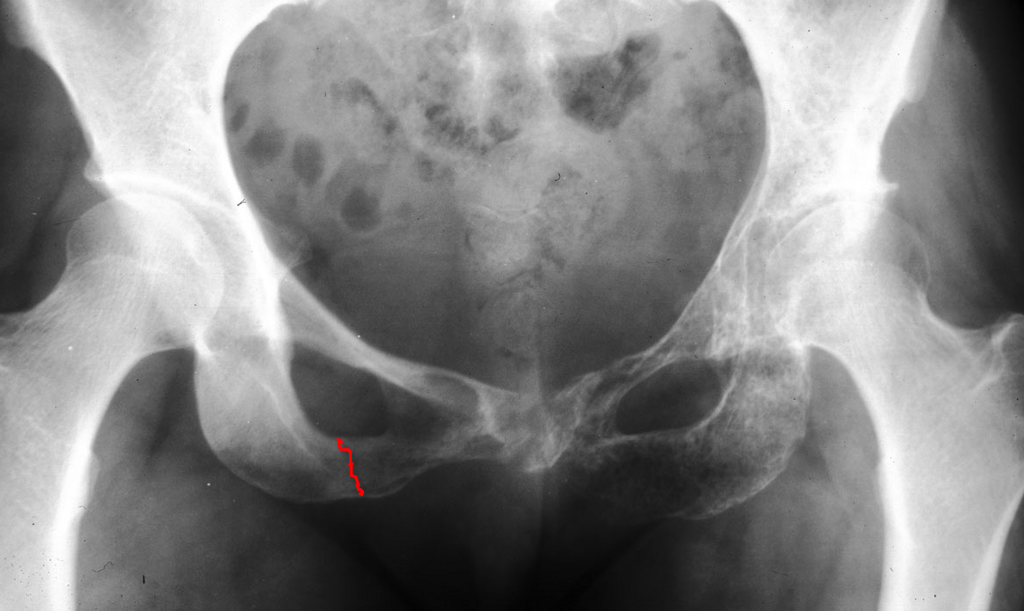
If any of you have known me for a long time, you know that this accident is not a surprise considering my history! In fact, I told Audrea, "When I call my mom to tell her, I'll bet you $20 she'll laugh!" And she did.
I'll conclude this long story with a comic strip that Audrea's mom was kind enough to send me in a get-well card. It epitomizes me in this situation.
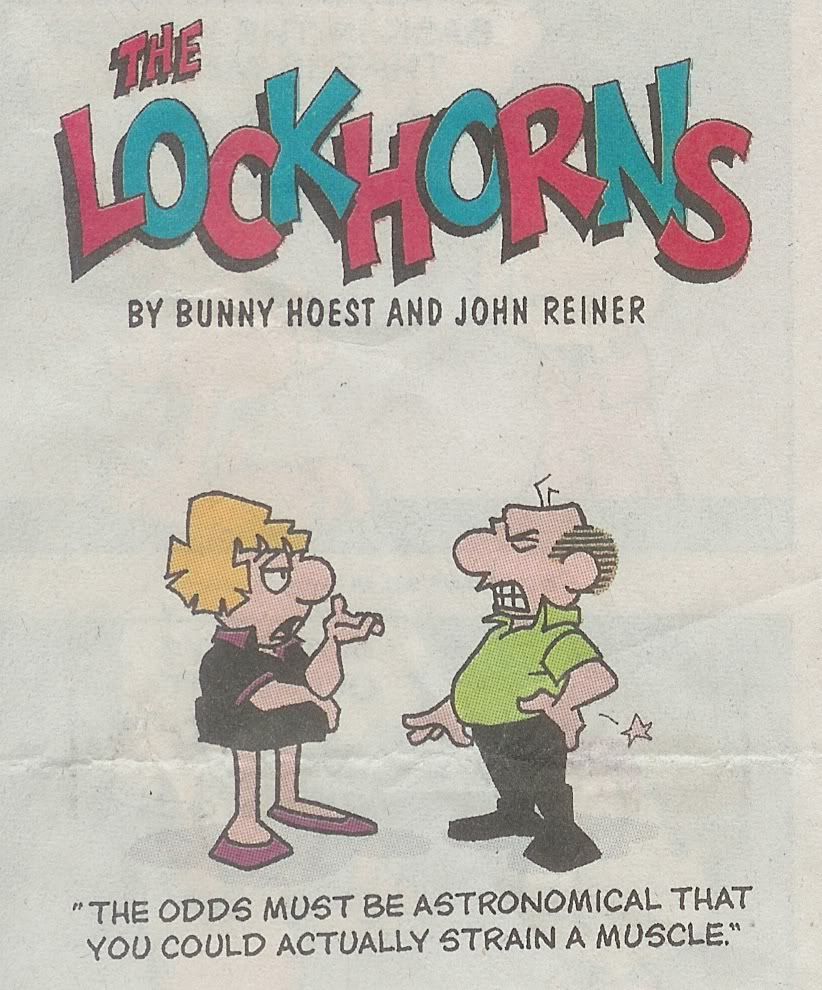
P.S. Audrea and I have been cracking up since this happened thinking about Uncle Rico telling Kip and Napoleon: "Grandma took a little spill at the sand dunes today. Broke her coccyx." Thankfully, I didn't break that!
Tuesday, May 13, 2008
Horsin' Around
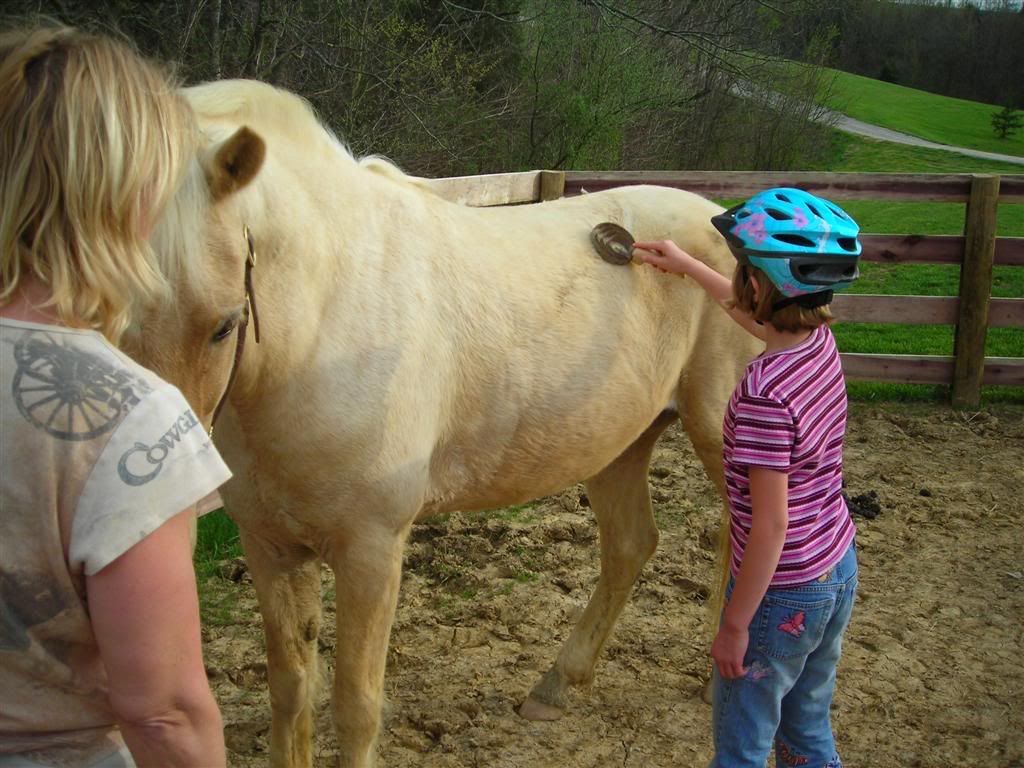
Savannah getting ready to ride:
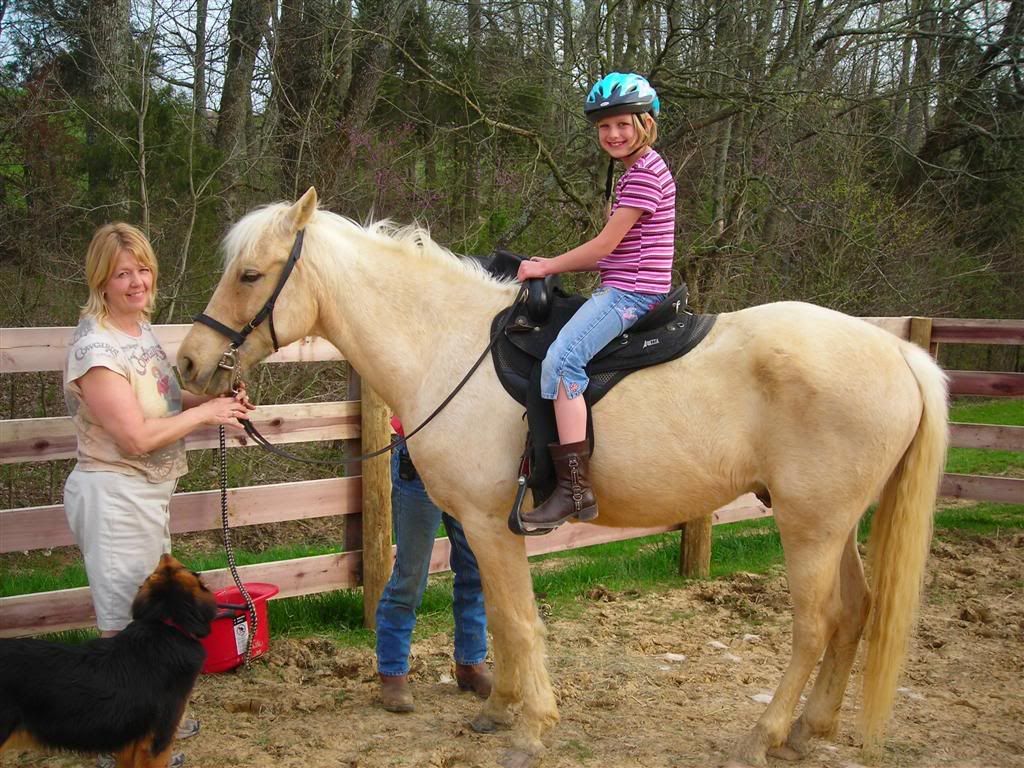
Sabrina and Audrea:
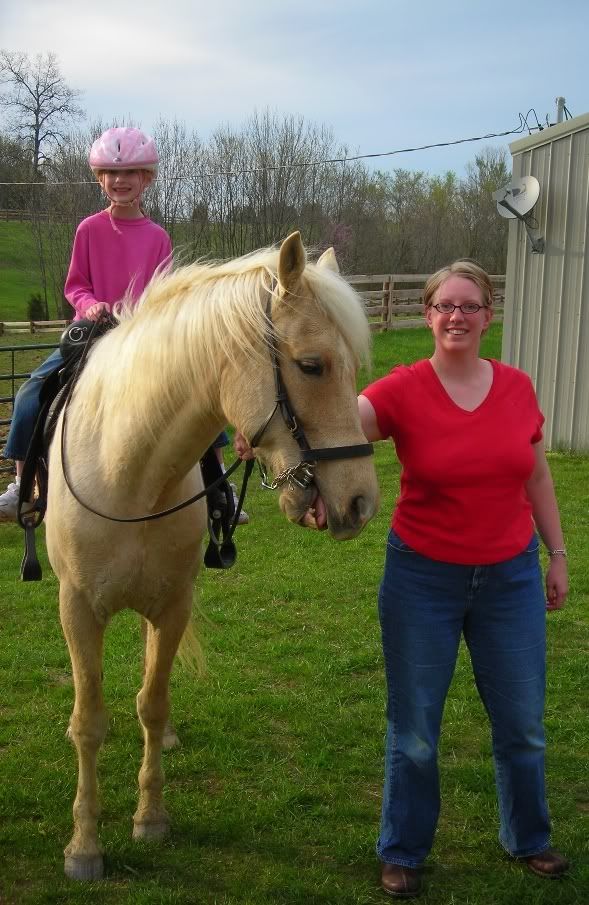
More horsin' around to come...
Saturday, May 03, 2008
A Bright Spot Is Gone
 Mary Coffman was brilliant and extremely talented and had the credentials to prove it. I remember having a conversation with one of my friends from high school once after we had gone off to college. In that conversation, he berated DACC as being a place for losers and full of unprofessional and sub-educated teachers. Besides being rather offended since I was one of those so-called losers, I was amazed he would say that in light of people like Mary Coffman. As you can read from the credentials in her obituary, she was no sluff. Fulbright scholars who earn their master's from the U of I and then study at Oxford, are not dull individuals!
Mary Coffman was brilliant and extremely talented and had the credentials to prove it. I remember having a conversation with one of my friends from high school once after we had gone off to college. In that conversation, he berated DACC as being a place for losers and full of unprofessional and sub-educated teachers. Besides being rather offended since I was one of those so-called losers, I was amazed he would say that in light of people like Mary Coffman. As you can read from the credentials in her obituary, she was no sluff. Fulbright scholars who earn their master's from the U of I and then study at Oxford, are not dull individuals!Friday, May 02, 2008
House Update
We've nailed down the purchase agreement on our home! Our prayers were answered in two major ways:
- Repair Requests: The furnace passed inspection and is safe and working! The breaker box had open slots to fix the existing double tapping on two circuits. The work that they have asked us to perform is minor safety things and we have agreed to get those done.
- Finances to pay for the closing: God has blessed us with three major donors that have contributed to help us cover the short sale! The first two gave us large donations that will cover the majority of the costs. The third individual has promised to give us an interest-free loan to cover whatever remaining balance is due at the closing. We will likely have to take advantage of that loan offer, but we are praising God for that.
The scheduled closing date is June 13th. What an amazing God we serve who answers prayer and provides for our every need!


